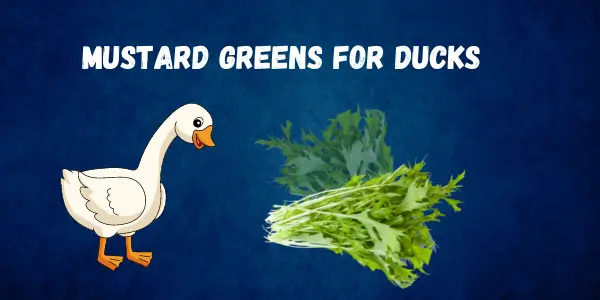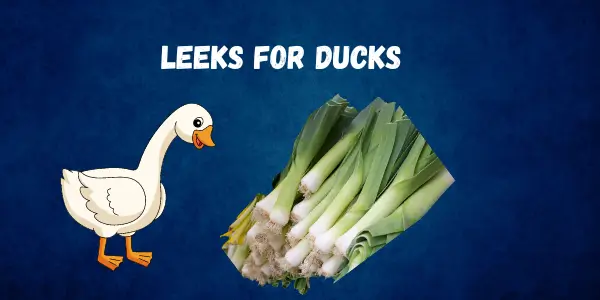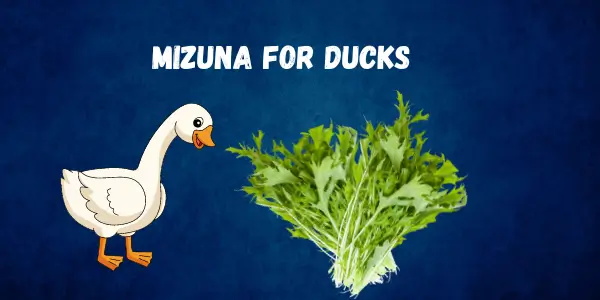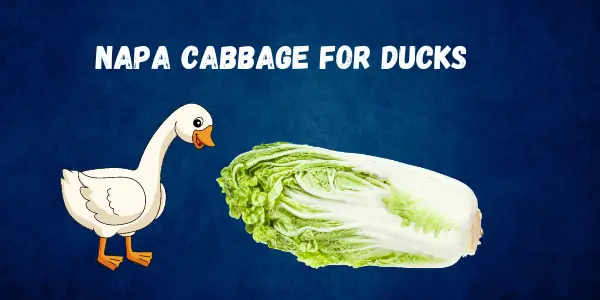Can Ducks Eat Parsnips? A Complete Feeding Guide
Published: 18 Sep 2024
Ducks eat a variety of foods, including grains, vegetables, fruits, and insects. Understanding what they can safely consume is essential for maintaining their health. Parsnips are a root vegetable that some duck owners may consider adding to their birds’ diet.
But are they safe? This guide explains whether ducks can eat parsnips, their nutritional value, and how to feed them properly.
Understanding a Duck’s Diet
A balanced diet is crucial for ducks. In the wild, they eat aquatic plants, small fish, insects, and grains. Domesticated ducks often have a diet supplemented with commercial feed, vegetables, and fruits. Essential nutrients like protein, calcium, and vitamins support their growth, egg production, and overall health.

Vegetables like leafy greens and root crops can provide additional nutrients. However, not all vegetables are safe. Some can cause digestive issues, while others lack the necessary nutrients for a well-rounded diet. This makes it important to analyze whether parsnips are a suitable choice for ducks.
Can Ducks Eat Parsnips?
Yes, ducks can eat parsnips, but with some precautions. Parsnips are not toxic to ducks, and they contain beneficial nutrients. However, they should be fed in moderation and prepared correctly.
Raw parsnips have tough fibers, which may be difficult for ducks to digest. Cooking softens them, making them easier to consume. Additionally, seasoning or additives should be avoided, as ducks do not process artificial ingredients well.
Nutritional Profile of Parsnips
Parsnips offer several nutrients that can be beneficial for ducks:
- Carbohydrates: Provide energy for daily activities.
- Fiber: Supports digestion but can be tough in excess.
- Vitamins (C, K, E, and B6): Support immune function and metabolism.
- Minerals (Potassium, Magnesium, Manganese): Aid in bone health and muscle function.
- Antioxidants: Help reduce inflammation and promote overall health.
Despite these nutrients, parsnips should not replace staple foods like grains and protein sources. They can be an occasional treat rather than a primary food source.
Are Parsnips Safe for Ducks?
Yes, parsnips are safe for ducks when given in moderation. They are not toxic and contain beneficial nutrients. However, their fibrous texture can be difficult for ducks to digest, especially when raw. Feeding parsnips in small, manageable pieces ensures they do not pose a choking hazard.
Ducks should always have a varied diet that includes grains, vegetables, and protein sources. Parsnips can be a part of their diet but should not replace essential foods like corn, leafy greens, and insects.
Health Benefits of Parsnips for Ducks
Parsnips contain several nutrients that can support a duck’s health:
- Energy Boost: Carbohydrates provide ducks with energy for swimming and foraging.
- Digestive Support: Fiber aids digestion but should be given in controlled amounts.
- Stronger Bones: Minerals like calcium and magnesium contribute to bone health.
- Immune System Support: Vitamin C and antioxidants help ducks fight infections.
- Feather and Skin Health: Vitamin E supports skin health and feather condition.
When included in a balanced diet, parsnips can offer additional nutrients that complement other natural food sources.
Potential Risks of Feeding Parsnips to Ducks
Despite their benefits, parsnips can pose some risks if not fed properly:
- Digestive Issues: High fiber content may be difficult for ducks to process, especially in large amounts.
- Choking Hazard: Large, hard pieces of raw parsnip can be difficult to swallow.
- Nutrient Imbalance: Overfeeding parsnips may reduce the intake of more essential foods like protein-rich insects and grains.
How to Feed Parsnips to Ducks Safely
Feeding parsnips to ducks requires proper preparation and portion control. While parsnips are not toxic, their fibrous nature can make them difficult to digest if not served correctly. Ducks should be given small, manageable pieces to prevent choking and digestive issues.
Raw vs. Cooked Parsnips: Which Is Better?
Cooked parsnips are the better option for ducks. Cooking softens the fibers, making them easier to chew and digest. Steamed or boiled parsnips, served plain without salt or seasoning, are safest for ducks.
Raw parsnips can be harder for ducks to eat. If feeding raw parsnips, they should be finely chopped or grated to reduce the risk of choking. Avoid feeding large, hard chunks, as ducks may struggle to break them down.
Proper Serving Sizes for Ducks
Parsnips should only be a small part of a duck’s diet. Overfeeding them can lead to nutrient imbalances, as ducks need a variety of foods to stay healthy.
- Small Ducks (e.g., Call Ducks, Teals): A few small bites, once or twice a week.
- Larger Ducks (e.g., Pekin, Muscovy): A tablespoon of chopped parsnips per feeding, no more than 2–3 times a week.
- Ducklings: Avoid feeding parsnips to young ducks, as their digestive systems are still developing.
Parsnips should be treated as an occasional supplement rather than a primary food source.
Mixing Parsnips with Other Foods in a Duck’s Diet
To provide a balanced diet, parsnips can be mixed with other vegetables and grains. Ducks thrive on a combination of natural foods that offer essential nutrients.
- Leafy Greens (Lettuce, Kale, Spinach): Rich in vitamins and minerals.
- Grains (Corn, Rice, Oats, Barley): Provide energy and fiber.
- Fruits (Berries, Apples, Melons): Offer antioxidants and hydration.
- Protein Sources (Insects, Mealworms, Small Fish): Support muscle growth and egg production.
- Mixing parsnips with other foods ensures ducks receive a variety of nutrients while preventing overconsumption of fiber.
FAQs Ducks Eating parsnips
Wild ducks primarily forage for natural food sources, such as aquatic plants, insects, and small fish. While they may eat small vegetable scraps, parsnips are not a common part of their diet.
Parsnip greens contain compounds that can be toxic to some animals. It is best to avoid feeding the leaves to ducks.
Parsnip peels are not harmful, but they can be tough and difficult to digest. If feeding peels, chop them finely or cook them first.
Parsnips contain beneficial vitamins and minerals but lack protein and essential fats. They should be fed alongside other nutrient-rich foods.
Conclusion: Should You Feed Parsnips to Ducks?
Parsnips can be a safe and nutritious treat for ducks when fed in moderation. They offer vitamins, minerals, and fiber but should not replace staple foods like grains, leafy greens, and protein sources.

- Be Respectful
- Stay Relevant
- Stay Positive
- True Feedback
- Encourage Discussion
- Avoid Spamming
- No Fake News
- Don't Copy-Paste
- No Personal Attacks

- Be Respectful
- Stay Relevant
- Stay Positive
- True Feedback
- Encourage Discussion
- Avoid Spamming
- No Fake News
- Don't Copy-Paste
- No Personal Attacks





